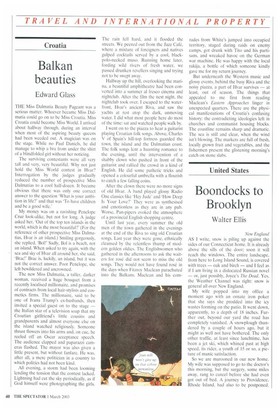Croatia
Balkan beauties
Edward Glass
THE Miss Dalmatia Beauty Pageant was a serious matter. Whoever became Miss Dalmatia could go on to be Miss Croatia. Miss Croatia could become Miss World. I arrived about halfway through, during an interval when most of the aspiring beauty queens had been weeded out. A magician was on the stage. While no Paul Daniels, he did manage to whip a bra from under the shirt of a blindfolded girl without her noticing.
The surviving contestants were all very tall and very, very beautiful. Why not just hold the Miss World contest in Hvar? Interrogation by the judges gradually reduced the number of prospective Miss Dalmatias to a cool half-dozen. It became obvious that there was only one correct answer to the question 'What is your ambition in life?' and that was 'To have children and be a good wife.'
My money was on a ravishing Penelope Cruz look-alike, but not for long. A judge asked her. 'Out of the top ten islands in the world, which is the most beautiful?' (For the reference of other prospective Miss Dalmatias, Hvar is an island.) Smiling gorgeously, she replied, 'Bol!' Sadly, Bol is a beach, not an island. When asked to try again, with the sea and sky of Hvar all around her, she said. 'Brae!' Brac is, luckily, an island, but it was not the correct answer. Poor Penelope, she left bewildered and uncrowned.
The new Miss Dalmatia, a taller, darker woman, received a huge bouquet from a recently localised millionaire, and promises of contracts from local hair-stylists and cosmetics firms. The millionaire, said to be one of Ivana Trump's ex-husbands, then invited a special guest on to the stage — the Italian star of a television soap that my Croatian girlfriend's little cousins and grandparents and almost everyone else on the island watched religiously. Someone thrust flowers into his arms and, on cue, he reeled off an Oscar acceptance speech. The audience clapped and paparazzi cameras flashed. The mayor was also given a little present, but without fanfare. He was, after all, a mere politician in a country to which politics had not been kind.
All evening, a storm had been looming lending the tension that the contest lacked. Lightning had cut the sky periodically, as if God himself were photographing the girls. The rain fell hard, and it flooded the streets. We peered out from the Jazz Café, where a mixture of foreigners and natives gulped cocktails served by a cool, blackpolo-necked muso. Running home later, fording wild rivers of fresh water, we passed drunken revellers singing and trying not to be swept away.
Halfway up the hill, overlooking the marina, a beautiful amphitheatre had been convened into a summer al fresco cinema and nightclub. After the film the next night, the nightclub took over. I escaped to the waterfront, Hvar's ancient Riva, and saw the yachts at rest atop the dark, unmoving water. I did what most people here do most of the time: sat and watched people walk by.
I went on to the piazza to hear a guitarist playing Croatian folk songs. Above, Charles V of Spain's hill-top fortress guarded the town, the island and the Dalmatian coast. The folk songs lent a haunting romance to the evening, until the intervention of a shabby clown who pushed in front of the guitarist and rallied the crowd in a kind of English. He did some pathetic tricks and opened a colourful umbrella with a flourish to catch a few falling coins.
After the clown there were no more signs of old Hvar. A band played glossy Radio One classics like 'Hey Jude and `How Deep Is Your Love?' They were as synthesised and emotionless as they are in any pub. Worse, Pan-pipers evoked the atmosphere of a provincial English shopping centre.
Until last year, every summer the old men of the town gathered in the evenings at the end of the Riva to sing old Croatian songs. Last year they were gone, ethnically cleansed by the relentless thump of modern golden oldies. The Englishwomen who gathered in the afternoons to ask the waiters for rosé did not seem to miss the old songs. They would not have found rosé in the days when Fitzroy Maclean parachuted into the Balkans. Maclean and his corn rades from White's jumped into occupied territory, staged daring raids on enemy camps, got drunk with Tito and his partisans, and wreaked havoc on the German war machine. He was happy with the local rakija, a bottle of which someone kindly gave me for my return journey.
But underneath the Western music and glossy events, behind the busy Riva and the noisy piazza, a part of Hvar survives — at least, out of season. The things that appealed to me first from reading Maclean's Eastern Approaches linger in unexpected quarters. There are the physical manifestations of Croatia's confusing history: the contradicting ideologies left in churches and communist housing blocks. The coastline remains sharp and dramatic. The sea is still and clear, when the wind isn't blowing. The markets are full of fresh, locally grown fruit and vegetables, and the fishermen present the glistening morning's catch on stone slabs.


















































































 Previous page
Previous page